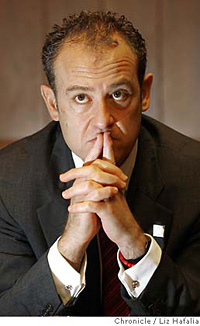
|  |  |  Editorials | Issues | May 2009 Editorials | Issues | May 2009  
Mexican Ambassador: Flu Exaggerated
 Reid Wilson - The Hill Reid Wilson - The Hill
go to original


| | Ambassador Arturo Sarukhan |  |
The Mexican ambassador to the United States said Thursday reports about the deadly H1N1 flu virus have dramatically overstated the disease's reach, and that just eight deaths can be definitively pinned on the virus.

Ambassador Arturo Sarukhan, addressing a luncheon sponsored by the Meridian International Group, said just 100 H1N1 virus cases have been confirmed in Mexico, far fewer than the nearly 2,000 press reports have indicated.

"Things in Mexico basically seem to be at a plateau," Sarukhan said, adding that the next 24 to 48 hours will indicate how far the virus has spread and whether it's been brought under control.

Sarukhan said those who would try to close the border with Mexico to stop the spread of the disease are misguided, and praised efforts of his own government and Canadian and American governments in responding to the crisis.

Closing the border "doesn't work. The World Health Organization, I think, has been very clear that shutting down the borders doesn't work and in many cases exacerbates" the spread of the disease, Sarukhan said. "I think shutting down the borders is a wonder policy: You do it, and then you wonder whether it's going to work."

Sarukhan also said Mexico and the United States have been working together to rename the affliction under its more scientific H1N1 designation, rather than calling it the swine flu. Humans cannot get the virus from eating pork, and misconceptions about transmission have caused Japan and Russia to halt importation of pork from the U.S. and Mexico.

"We have been very careful in trying to relabel this virus," he said. In the U.S., Agriculture Secretary Tom Vilsack and Homeland Security Secretary Janet Napolitano have each stressed the importance of disassociating the disease with pigs.

Assessing the state of the U.S.-Mexican relationship, Sarukhan said the new American administration seems to understand the necessity of re-engaging with Latin America as a whole and of building a strategic partnership with Mexico in particular.

But, he said, immigration issues will likely bubble to the top, and that securing the border should be a top priority for both sides.

"It behooves Mexico to work hand in hand with America to make sure our border is secure," the ambassador said. "We need the help of the United States to stop the flow of cash and weapons across the border into Mexico."

"Border security will be the fulcrum of a new debate on comprehensive immigration reform," he added.

Sarukhan also insisted that U.S. relations with Latin America will improve if Congress passes two trade deals that have generated controversy in recent years. A free trade pact with Colombia and Panama "will be an issue that will color the inter-American agenda if it does not move forward," he said.

House and Senate sources say the Panama deal stands a good chance of passing in the near future, given that labor leaders have voiced little opposition to the pact. The Colombian deal, the focus of a serious fight in the 110th Congress, is unlikely to pass this year, sources said.

With wars in Iraq and Afghanistan, a nuclear Iran and North Korea, Sarukhan admitted that diplomatic relations with Latin American countries would fall on the priority list. Still, he said, the region could present the U.S. and Mexico with trouble in the future.

"There have been fundamental changes in Latin America that don't guarantee peace, prosperity and stability," he said, pointing to democracies in Venezuela and elsewhere that feature strong presidents who can effectively rewrite their constitutions to hold on to power.

With a young administration in Mexico that has just secured a seat on the United Nations Security Council, Sarukhan said now is the time for the U.S. and Mexico to build a new strategic partnership.

"The challenge for Mexico and the U.S. is whether we can move from playing checkers to playing chess," he said. |

 |
|  |



